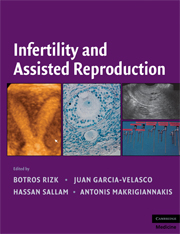Book contents
- Frontmatter
- Contents
- Contributors
- Foreword
- Preface
- Introduction
- PART I PHYSIOLOGY OF REPRODUCTION
- PART II INFERTILITY EVALUATION AND TREATMENT
- PART III ASSISTED REPRODUCTION
- 38 Medical Strategies to Improve ART Outcome: Current Evidence
- 39 Surgical Preparation of the Patient for In Vitro Fertilization
- 40 IVF in the Medically Complicated Patient
- 41 Polycystic Ovary Syndrome and IVF
- 42 Endometriosis and Assisted Reproductive Technology
- 43 Evidence-Based Medicine Comparing hMG/FSH and Agonist/Antagonist and rec/Urinary hCG/LH/GnRH to Trigger Ovulation
- 44 Luteal Phase Support in Assisted Reproduction
- 45 Thrombophilia and Implanation Failure
- 46 Intrauterine Insemination
- 47 The Prediction and Management of Poor Responders in ART
- 48 Oocyte Donation
- 49 In Vitro Maturation of Human Oocytes
- 50 Oocyte and Embryo Freezing
- 51 Cryopreservation of Male Gametes
- 52 The Management of Azoospermia
- 53 Spermatid Injection: Current Status
- 54 Optimizing Embryo Transfer
- 55 Single Embryo Transfer
- 56 Blastocyst Transfer
- 57 Clinical Significance of Embryo Multinucleation
- 58 Quality and Risk Management in the IVF Laboratory
- 59 The Nurse and REI
- 60 Understanding Factors That Influence the Assessment of Outcomes in Assisted Reproductive Technologies
- 61 The Revolution of Assisted Reproductive Technologies: How Traditional Chinese Medicine Impacted Reproductive Outcomes in the Treatment of Infertile Couples
- 62 Complications of Assisted Reproductive Technology
- 63 Ectopic and Heterotopic Pregnancies Following in Vitro Fertilization
- 64 The Impact of Oxidative Stress on Female Reproduction and ART: An Evidence-Based Review
- 65 PGD for Chromosomal Anomalies
- 66 Preimplantation Genetic Diagnosis for Single-Gene Disorders
- 67 Epigenetics and ART
- 68 Congenital Anomalies and Assisted Reproductive Technology
- PART IV ETHICAL DILEMMAS IN FERTILITY AND ASSISTED REPRODUCTION
- Index
- Plate section
- References
48 - Oocyte Donation
from PART III - ASSISTED REPRODUCTION
Published online by Cambridge University Press: 04 August 2010
- Frontmatter
- Contents
- Contributors
- Foreword
- Preface
- Introduction
- PART I PHYSIOLOGY OF REPRODUCTION
- PART II INFERTILITY EVALUATION AND TREATMENT
- PART III ASSISTED REPRODUCTION
- 38 Medical Strategies to Improve ART Outcome: Current Evidence
- 39 Surgical Preparation of the Patient for In Vitro Fertilization
- 40 IVF in the Medically Complicated Patient
- 41 Polycystic Ovary Syndrome and IVF
- 42 Endometriosis and Assisted Reproductive Technology
- 43 Evidence-Based Medicine Comparing hMG/FSH and Agonist/Antagonist and rec/Urinary hCG/LH/GnRH to Trigger Ovulation
- 44 Luteal Phase Support in Assisted Reproduction
- 45 Thrombophilia and Implanation Failure
- 46 Intrauterine Insemination
- 47 The Prediction and Management of Poor Responders in ART
- 48 Oocyte Donation
- 49 In Vitro Maturation of Human Oocytes
- 50 Oocyte and Embryo Freezing
- 51 Cryopreservation of Male Gametes
- 52 The Management of Azoospermia
- 53 Spermatid Injection: Current Status
- 54 Optimizing Embryo Transfer
- 55 Single Embryo Transfer
- 56 Blastocyst Transfer
- 57 Clinical Significance of Embryo Multinucleation
- 58 Quality and Risk Management in the IVF Laboratory
- 59 The Nurse and REI
- 60 Understanding Factors That Influence the Assessment of Outcomes in Assisted Reproductive Technologies
- 61 The Revolution of Assisted Reproductive Technologies: How Traditional Chinese Medicine Impacted Reproductive Outcomes in the Treatment of Infertile Couples
- 62 Complications of Assisted Reproductive Technology
- 63 Ectopic and Heterotopic Pregnancies Following in Vitro Fertilization
- 64 The Impact of Oxidative Stress on Female Reproduction and ART: An Evidence-Based Review
- 65 PGD for Chromosomal Anomalies
- 66 Preimplantation Genetic Diagnosis for Single-Gene Disorders
- 67 Epigenetics and ART
- 68 Congenital Anomalies and Assisted Reproductive Technology
- PART IV ETHICAL DILEMMAS IN FERTILITY AND ASSISTED REPRODUCTION
- Index
- Plate section
- References
Summary
Keywords
- Type
- Chapter
- Information
- Infertility and Assisted Reproduction , pp. 443 - 447Publisher: Cambridge University PressPrint publication year: 2008

